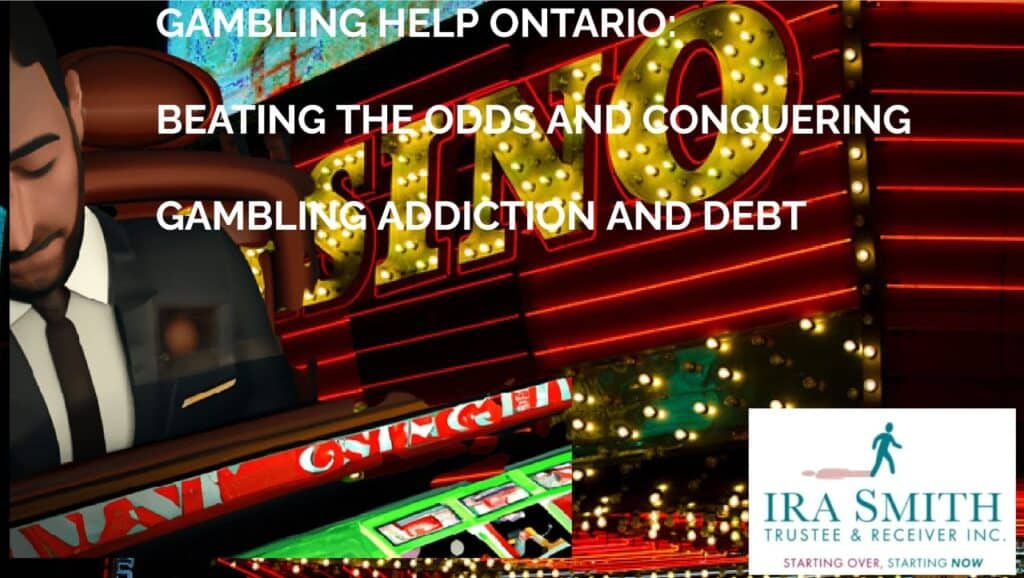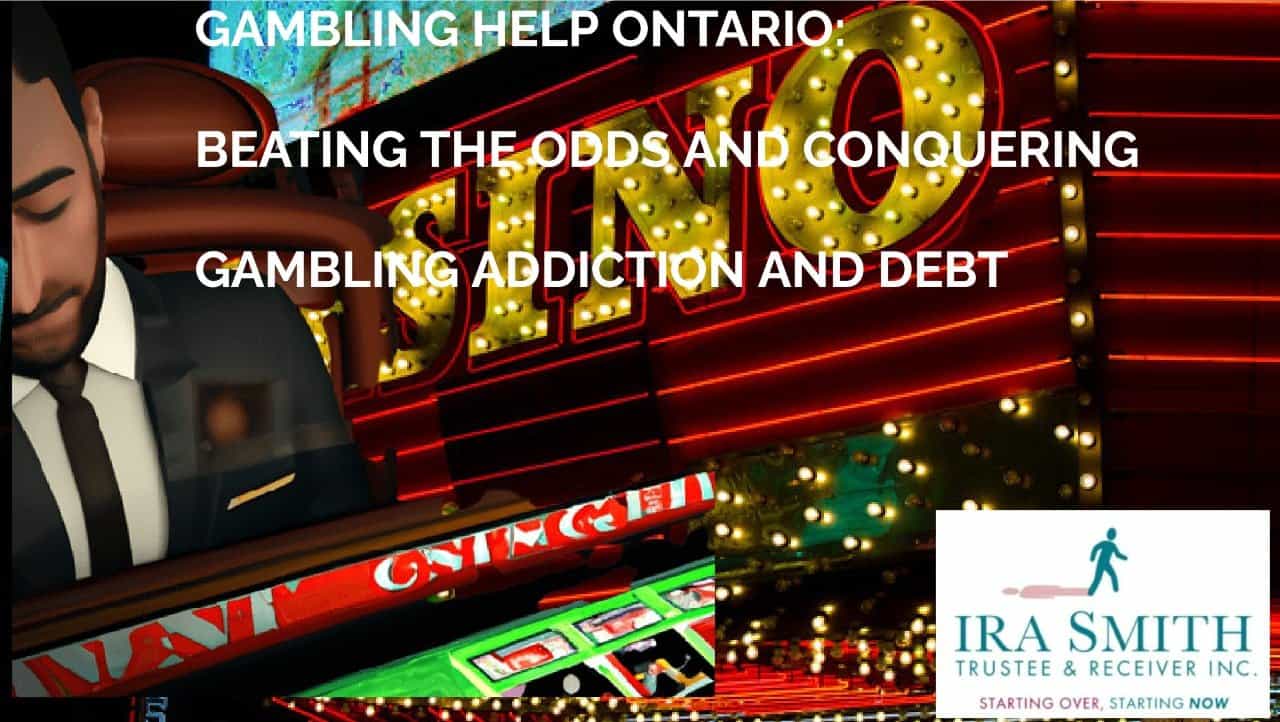gambling help ontario
Gambling help Ontario: What is gambling?
Gambling is the act of betting or wagering on the outcome of an event or a game with the intention of winning money or other material goods. It can take many forms, including playing games of chance like slot machines or cards, betting on sports events or horse races, or participating in games of skill like poker or blackjack.
Gambling can be done in person, such as in a casino or at a horse racing racetrack, or online. It is important to note that gambling can be addictive and can have negative consequences if it is not done responsibly. With the proliferation of online gambling opportunities in Canada, in this Brandon’s Blog, I discuss the issue of gambling, gambling addiction, gambling debt, and gambling help Ontario. I am talking about impulsive behaviour leading to addiction, not about the social gambler.
Gambling help Ontario: What is gambling addiction?
Gambling disorder is a type of impulse control disorder, commonly referred to as pathological or compulsive gambling behaviour, which is characterized by a persistent and recurrent inability to resist the urge to gamble, despite the potential for serious negative consequences. Individuals suffering from gambling addiction may continue to gamble despite the consequences.
Gambling can be a real problem, resulting in financial issues, relationship stress, and lower work performance. It can also lead to mental health concerns like anxiety and depression. If you think you, or someone you know, might be dealing with a gambling addiction, it’s important to get gambling help Ontario.

Gambling help Ontario: What are some of the usual factors behind a gambling problem?
Pathological gambling, commonly referred to as gambling addiction, is a form of impulse control disorder. Those affected by this disorder experience gambling habits which are an intense compulsion to gamble, even when they are aware of the potential adverse effects it can have on their lives.
Potential contributors to the emergence of a gambling dependency may include, but are not limited to:
- Biological factors: Some research suggests that gambling addiction may have a genetic component and that certain brain chemicals may be involved in the development of the disorder.
- Psychological factors: People with certain personality traits, such as impulsivity and a need for novelty and excitement, may be more prone to developing a gambling addiction.
- Environmental factors: People who are exposed to gambling at an early age or who have access to gambling opportunities may be more likely to develop a gambling addiction.
- Social factors: Gambling addiction may be more common in people who have a social network that supports or encourages gambling, or in people who are isolated and may use gambling as a way to cope with stress or negative emotions.
- Cultural factors: Gambling is more accepted in some cultures than in others, and people who live in cultures where gambling is more prevalent may be more likely to develop a gambling addiction.
It’s important to note that gambling addiction can affect anyone, regardless of age, gender, or background. If you or someone you know is struggling with gambling addiction, it’s important to seek help as soon as possible.
Gambling help Ontario: What is the prevalence of gambling addiction among individuals?
Accurately estimating the prevalence of gambling addiction in Canada is challenging due to underreporting of the disorder. Nevertheless, studies suggest that gambling addiction is a major public health issue in this country.
The Canadian Centre on Substance Use and Addiction (CCSA) estimates that approximately 2% of Canadian adults are affected by problem gambling, characterized by adverse financial, relational, and mental health outcomes.
With respect to alcohol addiction, the CCSA estimates that approximately 5% of the adult population in Canada meets the criteria for alcohol addiction. This includes approximately 10% of men and 3% of women.
The CCSA also estimates that approximately 5% of the adult population in Canada meets the criteria for drug addiction. This includes approximately 10% of men and 3% of women.
It’s important to note that all addictions, including gambling addiction, can have serious consequences for individuals and their families. If you or someone you know is struggling with addiction, it’s important to seek help as soon as possible. There are many resources available in Canada to help people who are struggling with addiction, including support groups, credit counselling, and rehabilitation programs.

Gambling help Ontario: How do I stop gambling?
Gambling addiction can be a difficult disorder to overcome, but it is possible for gambling addicts to overcome their gambling concerns and addictive behaviour, stop gambling and regain control of their life. Here are some steps you can take to stop gambling:
- Seek help: One of the most important things you can do to stop gambling is to seek help from a healthcare professional or a support group, particularly a gambling help services group. A therapist or counselor who specializes in treating gambling addiction can help you identify the underlying causes of your gambling and develop strategies to overcome it.
- Set goals: Identify specific goals that you want to achieve, such as paying off debt or rebuilding relationships with loved ones. Setting goals can help you stay focused and motivated as you work to overcome your gambling addiction.
- Avoid triggers: Identify the situations and circumstances that trigger your desire to gamble, and try to avoid these triggers as much as possible. This may include avoiding places where gambling is available, such as casinos, or avoiding activities that you associate with gambling, such as watching sports or playing card games.
- Find healthy coping mechanisms: Gambling may have been a way for you to cope with stress or negative emotions, so it’s important to find healthier ways to manage these feelings. This may include exercising, spending time with friends and family, or practicing relaxation techniques such as deep breathing or meditation.
- Get support: Surround yourself with a support network of friends, family, and loved ones who can offer encouragement and support as you work to overcome your gambling addiction. Joining a support group, such as Gamblers Anonymous, can also be a helpful way to connect with others who are facing similar challenges.
Remember, overcoming gambling addiction takes time and effort, and it’s important to be patient with yourself. It may take several attempts before you are able to successfully stop gambling. Don’t get discouraged, and keep seeking help if you need it.
Gambling help Ontario: Strategies for managing debt from gambling
People with gambling problems ultimately will have significant debt, which can be overwhelming and stressful. If you are struggling with gambling addiction and debt, it’s important to take steps to address both issues as soon as possible. Here are some steps you can take to deal with gambling addiction debt:
- Acknowledge the problem: The first step in recovering from gambling debt is to admit that you have a problem and take responsibility for it. This can be difficult, but it is an essential step in the recovery process.
- Create a budget: To manage your debt payments, you need to have a clear understanding of your financial situation. Create a budget that takes into account your income, expenses, and debts.
- Make a plan to pay off your debts: Once you have started to address your gambling addiction, it’s important to make a plan to pay off your debts. This may include negotiating with creditors, consolidating your debts, or seeking assistance from a debt management organization.
- Cut expenses: Look for ways to cut your expenses so that you can free up more money to put towards your gambling debt. This might involve cutting back on non-essential expenses, such as dining out or entertainment.
- Look for additional income: If you are unable to cover your debts with your current income, consider looking for additional sources of income, such as taking on a part-time job or selling assets.
- Negotiate with creditors: If you are unable to make your minimum payments, consider negotiating with your creditors to see if they will accept a lower payment or extend the repayment period.Retain a lawyer: If negotiations with creditors fail or if you are facing legal action, it may be beneficial to consult a legal professional for assistance.
- Speak to a licensed insolvency trustee (formerly called a licensed bankruptcy trustee): If you feel that you are in over your head in debt and there is no way out of it, get a no-cost consultation with a licensed insolvency trustee who can review your situation and make recommendations.
- Avoid temptation: To avoid falling into gambling debt again, it is important to avoid situations that may trigger your gambling addiction. This might mean avoiding casinos or online gambling sites or finding alternative ways to cope with stress or boredom.
- Seek support: Recovery from gambling debt is a long and difficult process. It is important to seek support from friends, family, and professional resources to help you stay on track and achieve your financial goals.
- Using a financial professional such as a non-profit credit counselor or a debt coach: They can determine if they can make a plan for you that will see you pay off your debts in a reasonable period of time. If not, they will recommend you seek advice from a licensed insolvency trustee.
- Deny access to financial resources and credit: In order to impede any additional gambling activities and debt accumulation, it may be wise to restrict your access to money and credit. This could involve canceling credit cards and lines of credit, closing bank accounts, or entrusting a reliable relative or friend to manage your funds.

gambling help ontario
Gambling help Ontario: Is it possible to have gambling debts eliminated in bankruptcy proceedings?
In Canada, it is possible to have gambling debts eliminated in bankruptcy proceedings under certain circumstances.
Under the Bankruptcy and Insolvency Act (Canada), gambling debts may be discharged (eliminated) in bankruptcy if they meet certain criteria. For example, you must not have obtained the money to gamble with through fraud, embezzlement, or larceny.
It is advisable to seek the counsel of a licensed insolvency trustee if you are thinking of filing for bankruptcy with regard to financial obligations resulting from gambling. Doing so will allow you to gain an understanding of the available options and specific regulations applicable to your circumstance so that you can make an informed decision on whether bankruptcy is the best course to take.
Bankruptcy should not be the first option for dealing with a gambling addiction; it should be the last resort. Therefore, it is necessary to explore other options first. However, if any insolvency process is pursued, one must also be committed to tackling the addiction head-on in order to achieve a full recovery. Ignoring the root of the problem and simply filing for bankruptcy will not benefit anyone in the long run.
Gambling help Ontario: If bankruptcy is the last resort, what is first?
The answer is a consumer proposal. A licensed insolvency trustee can offer both a consumer proposal and bankruptcy as two options that are available to individuals who are struggling with debt and are unable to pay their bills. Both options can help you manage your debts and get a fresh start financially, but they work in different ways and have different consequences.
A consumer proposal is a formally proposed payment plan to creditors. Administered by an insolvency trustee, the proposal is intended to have the person make an affordable monthly payment for no more than 60 months to settle all of the debt. It must be approved by creditors.
There are some key differences between a consumer proposal and bankruptcy in Canada. To be eligible for a consumer proposal or bankruptcy, an individual must be insolvent. To qualify for a consumer proposal, you cannot owe more than $250,000 (excluding mortgage debt) and need to have a reliable regular income source.
Feel free to reach out to me to find out more about a consumer proposal for debt relief.

Gambling help Ontario: Dealing with gambling-related financial difficulties? You are not alone
I hope that you found this gambling help Ontario Brandon Blog helpful. Other types of addiction can also result in debts.
If you or your business are facing serious debt issues, and you are unsure if bankruptcy is the best solution, call me for advice on ways to tackle your debt, whether it stems from gambling or other sources.
It is not your fault that you remain in this way. It has been demonstrated that traditional methods of addressing financial difficulties are inadequate. These old ways do not work anymore.
The Ira Smith Team utilizes new modern-day ways to get you out of your debt difficulties with debt relief options as alternatives to bankruptcy. We can get you the relief you need and so deserve. Our professional advice will create for you a personalized debt-free plan for you or your company during our no-cost initial consultation.
The tension put upon you is big. We know your discomfort factors. We will thoroughly evaluate your circumstances and devise a tailor-made solution to address both your financial and emotional concerns. Let us lighten your load and dispel any lingering concerns. We will design a debt settlement strategy for you. We know that we can help you now.
We recognize that individuals and companies facing monetary difficulties require an optimistic opportunity for hope. The Ira Smith Team offers a wide array of solutions to fit any situation – never settle for a one-size-fits-all approach!. Not everyone has to file for bankruptcy in Canada. Most of our clients never give up and explore the alternatives to bankruptcy, thus taking control of their financial future! Our mission is to empower people and businesses to steer clear of bankruptcy and achieve financial success.
You can create a unique payment plan to conquer debt and achieve financial success! It will be as unique and extraordinary as the challenges and struggles you are facing. If any one of these seems familiar to you and you are serious about getting the solution you need to become debt-free, contact the Ira Smith Trustee & Receiver Inc. group today.
Call us now for a no-cost bankruptcy consultation.




